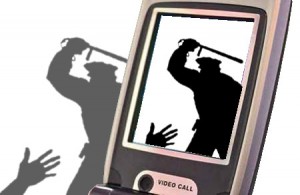Monitoring Big Brother: Is It Okay To Record The Police?
 Like clockwork, it seems like every month another story comes out about law enforcement abusing their powers or making mistakes in general. They are almost a permanent fixture for most local news networks. And unlike the constant stream of love directed toward firefighters, people in general are more wary of the boys in blue. So much so that entire websites have sprung up dedicated to watching the cops tasked with watching over the public. One blog recently caught my attention because the blogger running it is currently offering $100 to the best police video submitted to the site. The rules for submission are simple, just film a cop conducting their duties and the best one wins. The money offered is paltry, but the blog post highlights an interesting dilemma, one that is especially ripe in confusion and uncertainty in our internet age: Is it legal to film police?
Like clockwork, it seems like every month another story comes out about law enforcement abusing their powers or making mistakes in general. They are almost a permanent fixture for most local news networks. And unlike the constant stream of love directed toward firefighters, people in general are more wary of the boys in blue. So much so that entire websites have sprung up dedicated to watching the cops tasked with watching over the public. One blog recently caught my attention because the blogger running it is currently offering $100 to the best police video submitted to the site. The rules for submission are simple, just film a cop conducting their duties and the best one wins. The money offered is paltry, but the blog post highlights an interesting dilemma, one that is especially ripe in confusion and uncertainty in our internet age: Is it legal to film police?
The short answer is yes, but with exceptions which we’ll get into later. What’s important to note first is that this question of legality is poignant not just because it delves into the legal aspects of our constitutional rights, but because it really is a question addressing the means in which we as American citizens may employ to ensure our own safety. As noted earlier, websites about police preventing people from recording police activity are all over the internet, and issues of police brutality and violence seem like an unfortunate constant. Furthermore, with the proliferation of personal recording devices in the form of cell phones, laptops, iPods, and security cameras, it’s hard to go anywhere in America these days without having your image caught in one form or another.
But getting back to the initial question posed in this post though, it’s generally legal to record police or in fact anyone at all with or without their consent. However, please, please take note of the fact that “generally” doesn’t mean “always” because there are limits to this rule.
Laws regarding recording, whether by audio, video, photography, or a by combination of these forms can vary from state to state, and even among the federal districts, too. But typically, if you want to record a police officer, you can do it as long as you’re conducting the recording in a public place. This rule applies to recording non-law enforcement, as well, (hence the popularity and continued existence of TMZ). This means in most states, if a cop pulls you over in a public street for speeding, you’d be in your right to record your transaction with the officer. But say for instance, if police are investigating a murder scene in someone’s private house, a private citizen wouldn’t be able to waltz in and start recording the event unless they were authorized to do so (such as in the case of press photographers).
I mentioned earlier that usually consent wasn’t needed. This is generally true as long as the recording is done in public; but in some states, such as Maryland, laws can be wildly different. A Baltimore motorcyclist learned that the hard way when he was slapped with a felony charge from the Baltimore district attorney’s office for illegally recording a police officer without their knowledge. Even though the man was pulled over in a public street, under Maryland law, law enforcement officers must still give their consent prior to being recorded. Stranger still, some states simply require that the person recording must either announce that they’re recording or record in such a way that it’s obvious to the person or officer that they are being recorded.
So what should you do if you want to record a cop? Well, before you do it or end up in a situation where you feel inclined to, check your state’s local laws on police surveillance. And if you’re still nervous about it, you can always just ask for permission from the officer or person you’re planning to record prior to recording them. This can be done directly or by simply announcing that you’re in a possession of a live recording device. This is a good tip to consider, especially if you’re planning to try to win that $100.


Comments